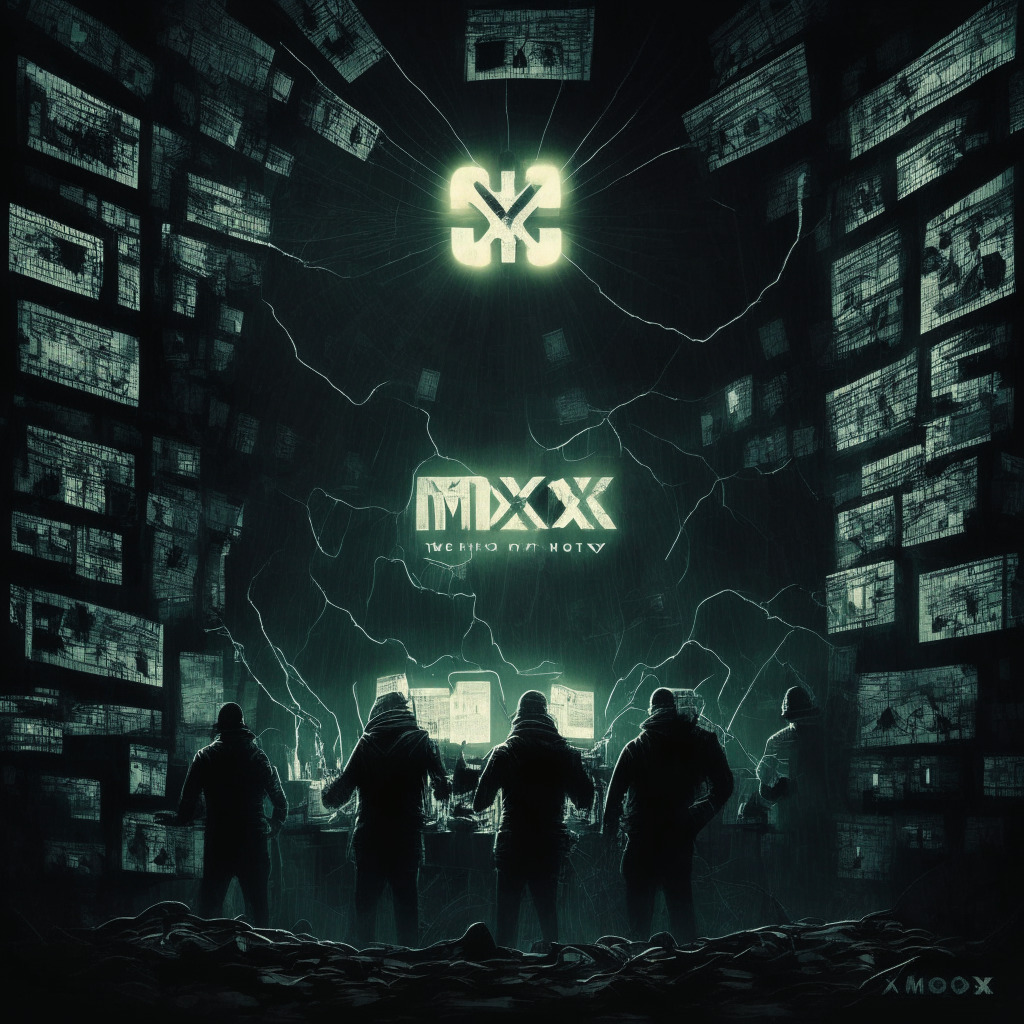“DoJ asserts that absence of specific US crypto regulation does not invalidate criminal charges against Sam Bankman-Fried, former FTX CEO. Existing laws against misappropriation of customer assets still apply. This situation highlights imbalances in current crypto regulations, where extant laws can yield harsh punitive consequences in new situations.”
Search Results for: DoJ
DOJ vs. Former FTX Executive: A Crypto Legal Showdown and its Potential Impact
“The upcoming trial of former FTX executive, Sam Bankman-Fried, aims to unravel FTX’s approach in managing customer assets, a key factor for the case’s outcome. Meanwhile, Ethereum co-founder, Vitalik Buterin, expresses concerns about a possible monopoly by decentralized autonomous organizations (DAOs), highlighting potential vulnerabilities in the blockchain ecosystem.”
Cry for Crypto Regulation: Ex-SEC Official Urges for Greater DOJ Involvement
Former SEC official John Reed Stark argues that the SEC’s current capabilities are insufficient to handle the growing, flexible crypto sector. Stark believes that the Department of Justice’s involvement is indispensable to impose penal measures as the SEC’s mandate restricts it to civil enforcement.
DOJ Vs Bankman-Fried: A Turning Point in Crypto Legal Defense?
The U.S. DOJ has called for more substantial information against Sam Bankman-Fried, dismissing his preliminary defense as “irrelevant”. The case exemplifies the need for complete transparency and robust legal guidance in the volatile crypto market, stressing the importance of providing comprehensive disclosures as precautions against legal challenges.
Crypto Tycoon Sam Bankman-Fried’s Battle with DOJ: A Chess Match with Far-reaching Implications
“The indictment of Sam Bankman-Fried, the force behind cryptocurrency exchange FTX, has raised questions about the legal framework surrounding blockchain technology. Accused of various fraud charges, Bankman-Fried’s defense insists that lawyers approved his contested actions at FTX. The case’s outcome could set important precedents for the crypto industry.”
US DoJ Targets Expert Witnesses in Crypto Case: Unforeseen Impact on Blockchain’s Future
“The US Department of Justice (DoJ) aims to dismiss expert witnesses in a case involving Sam Bankman Fried (SBF), citing deficiencies in their testimonies. Meanwhile, Jacobi Asset Management classifies its Bitcoin ETF as an Article 8 fund, promoting environmental sustainability. These developments highlight the balance between regulatory pressures and environmental sustainability in the blockchain space.”
U.S. DOJ’s Innovative Approach to Crypto-Related Prosecution: FTX Founder’s Tryst with the Law
The U.S. DOJ is shifting its legal focus on FTX founder, Sam Bankman-Fried, from treaty obligations to allegations of “illegal campaign finance” within a wire fraud charge. This new move involves combining diverse charges, shedding light on how Bankman-Fried allegedly intertwined illegal campaign finances within broader fraudulent and money laundering schemes.
Impending U.S. DoJ Action against Binance: The Possible Catalyst for a Crypto Market Meltdown
The US Department of Justice (DoJ) reportedly deliberates on fraud charges against Binance, one of the world’s largest crypto exchanges. A potential indictment could cause an exodus from Binance, triggering losses and a broader market panic. Authorities are considering fines and deferred prosecution agreements to minimize consumer harm. Binance prepares for potential fallouts by securing assets and maintaining a healthy ratio for mass withdrawals. The incident highlights complexities in the world of cryptocurrencies, with watchful scrutiny on the looming regulatory battle.
Potential DOJ Binance Fraud Allegations: A Tug-of-War Between Justice and Crypto Stability
The U.S. Department of Justice (DOJ) is reportedly considering charging crypto exchange Binance with fraud allegations, sending ripples of concern through the blockchain community. This highlights ongoing skepticism around the authenticity and security of blockchain technology and crypto markets, yet also underscores the system’s internal checks and balances against misleading and fraud.
Winds of Change: FTX Founder Prevails Over DOJ in Unexpected Legal Turnaround
“The Department of Justice (DOJ) has dropped a campaign finance charge against FTX founder Sam Bankman-Fried. This followed a consultation with The Bahamas, as extradition under U.S treaty required their explicit consent. Bankman-Fried, embroiled in allegations of unlawful political contributions, allegedly used funds from Alameda Research to manipulate politics.”
The Maze Unravels: DOJ Digs into Celsius and Mashinsky’s Alleged Misdeeds
“Alex Mashinsky, founder of crypto lending platform, Celsius, faces accusations of securities fraud, wire fraud, and conspiracy to influence the price of CEL, Celsius’ token. DOJ’s request for extra time to comb through Celsius’ records and communications could potentially reshape the regulatory landscape of the crypto industry.”
The DOJ’s Vigilance in the Crypto Environment: Unveiling the Prospects of the National Crypto Enforcement Team
The U.S Department of Justice intends to enhance vigilance in the crypto space with the National Crypto Enforcement Team (NCET). Coupled with other computer crime divisions, the NCET plans to combat digital asset-related transgressions more efficiently through larger structures and enhanced resources. The team has displayed remarkable tenacity handling cases such as FTX incidents and other crypto infringements. The focus now lies in fostering understanding of this new “digital battlefield.”
DOJ Charges Two Russians in Mt. Gox Hack: Impact on Crypto Security and Investor Trust
The US DOJ charged two Russian men, Alexey Bilyuchenko and Aleksandr Verner, in connection with the Mt. Gox hack, alleging they conspired to steal 647,000 Bitcoins between 2011 and 2014. This case highlights the importance of securing digital assets and the potential risks faced by cryptocurrency users.
DOJ Charges Against Russian Nationals Expose Crypto’s Dark Side: A Call for Security and Regulation
The US Department of Justice charged two Russian nationals for their alleged involvement in the Mt. Gox hack and operating illicit crypto exchange BTC-e, highlighting cryptocurrency vulnerabilities and the need for robust oversight, security, and regulation to protect investors and combat criminal activities.
DOJ Charges in Mt. Gox Hack: A Milestone for Crypto Security or Proof of Industry’s Vulnerability?
The DOJ recently charged two Russian nationals for hacking Mt. Gox in 2011, stealing 647,000 BTC. This highlights the ongoing debate within the crypto community regarding safety and regulation, as the industry remains vulnerable to hacking and fraudulent activities.
Binance-US Controversy: Senators Call for DOJ Investigation, Impact on Crypto Industry
Senate Democrats Elizabeth Warren and Chris Van Hollen call for a U.S. Department of Justice investigation into Binance over alleged false statements and the questionable independence of Binance.US. The outcome could impact the crypto ecosystem’s progress, trust in exchanges, and regulatory actions.
DOJ May Drop Charges Against Ex-FTX CEO: A Win for Crypto or Loophole for Criminals?
The U.S. DOJ might drop charges against former FTX CEO Sam Bankman-Fried due to potential violations of the extradition agreement with the Bahamas. This highlights complexities and challenges in balancing crypto innovation with safety and regulations across global jurisdictions.
Crackdown on Short Selling: DOJ’s Actions and its Impact on Crypto Markets and Regulations
The Department of Justice (DOJ) is preparing to tackle short selling amid concerns over market manipulation, particularly as mid-size banks have faced sell-offs and collapses. DOJ official Avi Perry warns of increased scrutiny on short sellers, while the SEC’s regulatory role faces criticism, particularly in the ongoing Ripple case. The market’s evolution calls for improved regulatory frameworks and clear guidelines for investors.
DeFi Turbulence: DOJ Pursues Hackers, Lawsuits, and Ethereum Un-Staking
The DOJ’s crypto czar, Eun Young Choi, highlights the prominence of chain bridges thefts and hacks involving DeFi, emphasizing North Korean state-sponsored hackers’ significant role in exploits. Meanwhile, Ethereum un-staking commenced on the Beacon Chain and Coinbase Cloud joined forces with Chainlink Oracle network to improve smart contract reliability.
DeFi Hacks Spark US DoJ Crackdown: Protecting Innovation or Stifling Growth?
The US Department of Justice (DoJ) is increasingly concerned about the surge in decentralized finance (DeFi) hacks, with $49 billion reportedly lost in the crypto sphere in 2022. North Korean hackers have also joined the fray, stealing $1.7 billion in 2022 alone. The DOJ’s National Cryptocurrency Enforcement Team (NCET) aims to tackle cybercrime, money laundering, and crypto thefts, focusing on chain bridge thefts and hacks.
DOJ Crypto Unit Targeting Exchanges: Navigating Regulation and Avoiding Illicit Activities
The Department of Justice’s crypto enforcement unit, led by Eun Young Choi, is intensifying efforts against illegal activities in the digital assets sector, particularly targeting crypto exchanges that facilitate crimes and fail to follow compliance regulations. In addition, the unit will address investment scams and security issues within the decentralized finance ecosystem.
Crackdown on Crypto: DOJ Targets Exchanges & DeFi, Balancing Safety and Innovation
The US Department of Justice’s national cryptocurrency enforcement team (NCET) aims to crack down on bad actors in the crypto market, targeting exchanges, mixers, and DeFi platforms involved in offenses like money laundering. With increasing scrutiny from regulatory bodies, the enforcement efforts may promote a safer market for investors but potentially hinder the growth and development of the crypto sector.
Appointing DOJ’s Crypto Director: Balancing Security & Open-Source Innovation
The U.S. DOJ’s National Cryptocurrency Enforcement Team, led by Eun Young Choi, focuses on combating cybercrimes involving cryptocurrencies, including social media scammers and online fraudsters. Despite only 1% of transactions being tied to illegal activities, the crypto community must acknowledge its downsides and work on strategies to ensure long-term success and safety.
The Fall of FTX’s Sam Bankman-Fried: A Cautionary Tale or Web3 Symbol’s Downfall?
Cardano’s Charles Hoskinson compared FTX’s co-founder, Sam Bankman-Fried, to Ponzi scheme operator Bernie Madoff, criticizing his lenient media treatment. Following the FTX crash, allegations of misappropriation of user assets and extravagant purchases surfaced, leading to calls for stringent regulation in the crypto industry.
Legal Tussle in Cryptoverse: Ex-FTX CEO Accused of Fraud, Conspiracy and Misconduct
A high-stakes legal case involving former FTX CEO, Sam “SBF” Bankman-Fried, brings attention to regulatory scrutiny in the crypto industry. Accused of fraud and financial misconduct, the case centers on allegations of Bankman-Fried’s favoring Alameda Research with certain exemptions, questioning the transparency, trust, and ethics of crypto platforms.
Elon Musk vs SEC: A Battle Underscoring the Future of Crypto Regulations
“Tech magnate Elon Musk has challenged the SEC and DOJ, suggesting a “comprehensive overhaul” due to perceived abusive power use. The SEC’s probe into Musk’s massive Twitter purchase last year has ignited debates in the crypto community about the role of regulatory bodies in the industry. Musk’s recent acquisition of a currency transmitter license underscores his strong advocacy for crypto integration.”
Sanctions on Crypto Wallets Reveal Unwavering Regulatory Power and Challenge Decentralization Ethos
“The US Department of Treasury imposed sanctions on digital wallets tied to illicit activities by Chinese firms, revealing the reach of regulatory bodies in tracking crypto transactions on BTC, ETH, USDT, and TRX blockchains. This emphasizes the growing interlink between blockchain and regulation, pointing towards an era of advanced blockchain forensics.”
Unraveling the SBF Saga: Altruist or Lawbreaker in the Crypto World’s Courtroom?
“The primary issue at SBF’s trial is whether FTX, not regulated in the United States, is held to the same jurisdiction as FTX.US. The outcome might define the future of regulation in uncharted waters of the crypto world.”
Unraveling Former FTX CEO’s Trial: A Spotlight on Industry Protocol and Responsibilities
The upcoming trial of former FTX CEO, Sam Bankman-Fried, plans to spotlight on his conduct and expectations by bringing former FTX customers, investors, and staff members for testimonies. These testimonies are aimed to scrutinize Bankman-Fried’s actions and statements about asset management, thereby shaping the interpretation of his behaviour. The results of this trial hold significance for blockchain industry regulations.
Mental Health in Cryptocurrency: FTX Founder’s Struggles Ignite Industry Discourse
“The revelations about FTX founder Sam Bankman-Fried’s struggle with mental health issues and his approach to them within his company sparks a debate about the crypto industry’s stance on mental health. As industry pioneers become the faces of their enterprises, their personal narratives become inherently tied to their businesses, making the handling of mental health challenges a crucial business as well as a moral imperative.”
Unveiling the Paradox: Blockchain Potential Amid Rampant Security Concerns
“In a world advancing in blockchain technology, security remains a significant concern, as demonstrated by the FTX exploit which led to a $17.1M loss. This exploit caused swift Ethereum transfers, affecting crypto market sensibility and user confidence significantly.”
Unraveling the Bankman-Fried Case: A Turning Point for Crypto Regulation or Justice System Scrutiny?
“Bankman-Fried’s ongoing legal battle sets a precedent for future regulatory severity in the crypto industry. His case adds to the regulatory and responsibility discussions within the volatile crypto market. This situation compels us to reflect on industry assumptions about responsibility, transparency, and future crypto regulations.”































